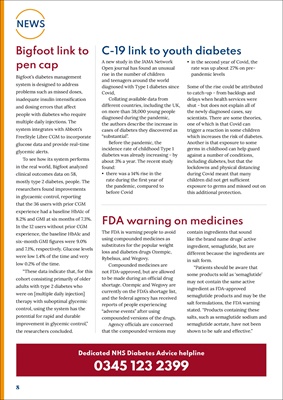
8
NEWS
C-19 link to youth diabetes
A new study in the JAMA Network
Open journal has found an unusual
rise in the number of children
and teenagers around the world
diagnosed with Type 1 diabetes since
Covid,
Collating available data from
different countries, including the UK,
on more than 38,000 young people
diagnosed during the pandemic,
the authors describe the increase in
cases of diabetes they discovered as
"substantial".
Before the pandemic, the
incidence rate of childhood Type 1
diabetes was already increasing - by
about 3% a year. The recent study
found:
• there was a 14% rise in the
rate during the first year of
the pandemic, compared to
before Covid
• in the second year of Covid, the
rate was up about 27% on prepandemic levels
Some of the rise could be attributed
to catch-up - from backlogs and
delays when health services were
shut - but does not explain all of
the newly diagnosed cases, say
scientists. There are some theories,
one of which is that Covid can
trigger a reaction in some children
which increases the risk of diabetes.
Another is that exposure to some
germs in childhood can help guard
against a number of conditions,
including diabetes, but that the
lockdowns and physical distancing
during Covid meant that many
children did not get sufficient
exposure to germs and missed out on
this additional protection.
FDA warning on medicines
The FDA is warning people to avoid
using compounded medicines as
substitutes for the popular weight
loss and diabetes drugs Ozempic,
Rybelsus, and Wegovy.
Compounded medicines are
not FDA-approved, but are allowed
to be made during an official drug
shortage. Ozempic and Wegovy are
currently on the FDA's shortage list,
and the federal agency has received
reports of people experiencing
"adverse events" after using
compounded versions of the drugs.
Agency officials are concerned
that the compounded versions may
contain ingredients that sound
like the brand name drugs' active
ingredient, semaglutide, but are
different because the ingredients are
in salt form.
"Patients should be aware that
some products sold as 'semaglutide'
may not contain the same active
ingredient as FDA-approved
semaglutide products and may be the
salt formulations, the FDA warning
stated. "Products containing these
salts, such as semaglutide sodium and
semaglutide acetate, have not been
shown to be safe and effective."
Dedicated NHS Diabetes Advice helpline
0345 123 2399
Bigfoot link to
pen cap
Bigfoot's diabetes management
system is designed to address
problems such as missed doses,
inadequate insulin intensification
and dosing errors that affect
people with diabetes who require
multiple daily injections. The
system integrates with Abbott's
FreeStyle Libre CGM to incorporate
glucose data and provide real-time
glycemic alerts.
To see how its system performs
in the real world, Bigfoot analyzed
clinical outcomes data on 58,
mostly type 2 diabetes, people. The
researchers found improvements
in glycaemic control, reporting
that the 36 users with prior CGM
experience had a baseline HbA1c of
8.2% and GMI at six months of 7.3%.
In the 12 users without prior CGM
experience, the baseline HbA1c and
six-month GMI figures were 9.0%
and 7.1%, respectively. Glucose levels
were low 1.4% of the time and very
low 0.2% of the time.
"These data indicate that, for this
cohort consisting primarily of older
adults with type 2 diabetes who
were on [multiple daily injection]
therapy with suboptimal glycemic
control, using the system has the
potential for rapid and durable
improvement in glycemic control,"
the researchers concluded.